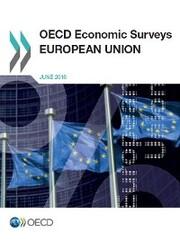The Organisation for Economic Co-operation and Development (OECD) has released its latest Economic Survey for Luxembourg, offering a comprehensive analysis of the country’s economic performance and policy outlook heading into 2025. The report highlights Luxembourg’s resilience amid global uncertainties, while addressing key challenges such as sustainable growth, innovation, and social inclusion. As one of Europe’s wealthiest nations, Luxembourg’s economic strategies and reforms outlined in the survey will be closely watched by policymakers and investors alike. This article delves into the main findings and recommendations presented in the 2025 OECD Economic Survey for Luxembourg.
Luxembourg’s Economic Growth Prospects Amid Global Challenges
Luxembourg continues to demonstrate remarkable resilience in maintaining steady economic expansion despite the turbulent global environment. Characterized by a diversified financial sector, robust industrial output, and a thriving digital economy, the country is well-positioned to navigate ongoing uncertainties such as geopolitical tensions and supply chain disruptions. The latest analysis underscores the critical role of innovation, particularly in green finance and fintech, as key drivers sustaining GDP growth. Policymakers are emphasizing targeted investments to enhance productivity while promoting sustainable development goals, reinforcing Luxembourg’s competitive edge on the international stage.
However, challenges remain, notably inflationary pressures and labor market tightness that may constrain growth momentum. The government’s strategic priorities include:
- Strengthening workforce skills through digital upskilling initiatives
- Enhancing energy efficiency to reduce dependence on volatile global energy markets
- Promoting greater economic diversification beyond finance and manufacturing
These measures aim to buffer against external shocks and foster inclusive growth. The table below outlines Luxembourg’s projected growth rates in key sectors for the next two years:
| Sector | 2024 Growth (%) | 2025 Growth (%) |
|---|---|---|
| Financial Services | 2.8 | 3.0 |
| Manufacturing | 1.5 | 1.7 |
| Information Technology | 4.5 | 5.2 |
| Green Energy | 3.2 | 4.0 |
| Construction | 1.0 | 1.3 |
Strengthening Financial Sector Resilience and Regulatory Frameworks
Luxembourg continues to bolster the robustness of its financial sector by enhancing regulatory frameworks that address emerging risks and promote transparency. The government, in collaboration with the Commission de Surveillance du Secteur Financier (CSSF), is prioritizing initiatives to strengthen liquidity requirements and improve stress testing mechanisms. These measures are designed to safeguard the banking system against external shocks while fostering trust among investors and depositors. Additionally, Luxembourg is embracing technological advancements to better monitor financial activities, emphasizing the integration of fintech solutions with traditional regulatory practices.
Key focus areas include:
- Enhancing cross-border regulatory cooperation within the EU and beyond
- Implementing stricter anti-money laundering (AML) protocols
- Promoting sustainable finance through green investment regulations
| Regulatory Measure | Objective | Status |
|---|---|---|
| Revised Capital Buffers | Increase resilience against market volatility | Implemented Q1 2025 |
| Fintech Sandbox Expansion | Support innovation while managing risk | Planned Q3 2025 |
| Enhanced AML Framework | Strengthen prevention of illicit financial flows | Ongoing review |
Boosting Innovation and Skills Development for Sustainable Competitiveness
Luxembourg continues to prioritize cutting-edge innovation and targeted skills development as cornerstones for maintaining its competitive edge in the European and global markets. The country’s strategic focus on fostering a vibrant research and development ecosystem is supported by increased public and private investment, creating fertile ground for emerging technologies such as artificial intelligence, fintech, and sustainable energy solutions. By emphasizing collaboration between academia, industry, and government, Luxembourg aims to accelerate the commercialization of breakthrough ideas, driving productivity and economic growth.
Crucial to this vision is the continuous upskilling and reskilling of the workforce to adapt to rapidly evolving labor market demands. Key measures include:
- Expanding vocational and technical training programs to align with future-oriented industries.
- Promoting lifelong learning initiatives to enhance workforce flexibility and innovation capacity.
- Strengthening digital literacy across all demographics, ensuring inclusivity and access.
| Sector | Innovation Investment Growth (2020-2024) | Skills Program Uptake (%) |
|---|---|---|
| Information Technology | 18% | 65% |
| Financial Services | 12% | 58% |
| Green Energy | 25% | 72% |
These concerted efforts not only nurture a knowledge-based economy but also ensure Luxembourg’s adaptability amid global economic shifts, fortifying its position as a hub of sustainable competitiveness for the years to come.
Insights and Conclusions
As Luxembourg navigates the evolving global economic landscape, the OECD Economic Surveys: Luxembourg 2025 provides a comprehensive assessment of the country’s strengths and challenges. With a robust financial sector and strong innovation capacity, Luxembourg is well positioned for future growth. However, the report also highlights areas requiring policy attention, including housing affordability and environmental sustainability. Stakeholders and policymakers alike will find this survey an essential resource in shaping strategies for Luxembourg’s continued prosperity in the years ahead.















